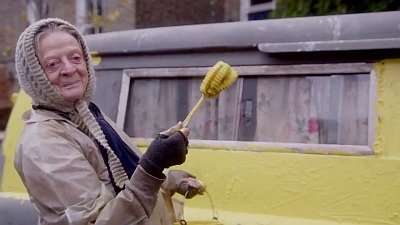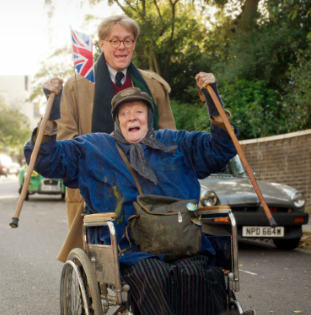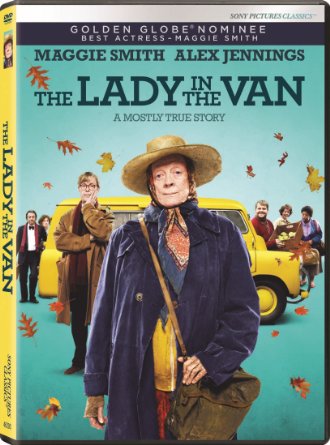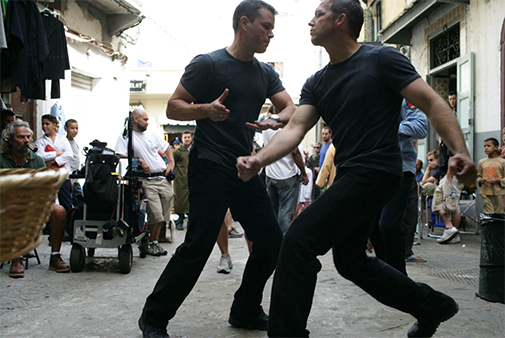Anne Marie here reporting from Hollywood & Highland.

Let's be honest: there's probably only one reason you (or anyone) is interested in The Lady in the Van. If you own a copy of The Best Exotic Marigold Hotel, if you kept watching Downton Abbey even after Julian Fellowes killed two main characters and the series lost focus, then I have good news for you: you will love The Lady in the Van. Dame Maggie Smith is in top form, and the movie is devoted to giving her a variety of small acting moments that pop up in awards show montages and internet gifsets. Even if the rest of Nicholas Hytner's movie is unrelentingly average, Dame Maggie Smith is a delight.
First, let's talk about Maggie. In the last 20 years, the Dame has made a career of playing colorful, curmudgeonly women, effectively destroying - along with her Dames in Arms Helen Mirren, Judi Dench, and Angela Lansbury - the idea that older actresses aren't interesting. (There's a question to be asked about why all of these successful, terribly interesting older actresses are British, but that's a tangent for another day.) As the titular homeless woman who parks in the driveway of a put-upon playwright (Alex Jennings) for 15 years, Maggie Smith continues this fine tradition. Alternately infuriating and empathetic, crazy and charismatic, disgusting and distinguished, Smith creates a character so bizarrely contradictory that you understand why the writer allowed himself to be inconvenienced for almost two decades beginning in the 1970s. Sitting next to Nathaniel and eurocheese, I don't know that I've seen a festival audience react as gleefully to a moment so small as when Dame Maggie Smith, clad in a nightdress and a smelly rain coat, cracked a small private smile while riding a duck on a merry go round.
The rest of the movie is about what you'd expect from a BBC drama - familiar character actors, comedy stemming from British polite timidity - with one exception. The playwright Alan Bennett (who adapted his own play for the screen) splits himself into two characters: the man living the events, and the writer observing them. At first, the conceit is fun, since it gives the observing ego a chance to make the snide remarks that polite British gentlemen just won't say. However, as with many movies that rely on narration, eventually the writer gets didactic, and begins informing the audience how to think and feel about his story. But what he refuses to comment on is more interesting. While he was busy belaboring the connection between his guilt over his ailing mother and the homeless woman he allows to sleep in his yard, I was more curious about his closeted sexuality in Margaret Thatcher's England.
 Ultimately, as a showpiece for Dame Maggie Smith, The Lady in the Van delivers. As a BBC drama, it's a little more interesting than usual. Jim Broadbent, Dominic Cooper, and James Corden all make appearances, but are criminally underused. There's one reason to see The Lady in the Van. But it's a good reason in itself.
Ultimately, as a showpiece for Dame Maggie Smith, The Lady in the Van delivers. As a BBC drama, it's a little more interesting than usual. Jim Broadbent, Dominic Cooper, and James Corden all make appearances, but are criminally underused. There's one reason to see The Lady in the Van. But it's a good reason in itself.
Grade: Maggie Smith A / Rest of the movie C+ Total = B
Oscar Chances: In a less competitive year, Dame Maggie Smith would be a shoe-in for a Best Actress nomination. As it is, she probably won't make the cut.
 Monday, April 25, 2016 at 10:00AM
Monday, April 25, 2016 at 10:00AM 










